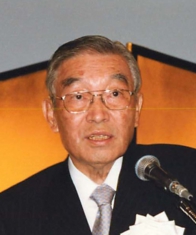 “We must subdue the evil spirits of the wilderness and create a world where the highest value is placed on humanity and life. To ensure that these ultimate goals are not utilized for materialistic interests or power plays, we must deliver our utmost efforts to make love, justice, and peace realities in this world.”
“We must subdue the evil spirits of the wilderness and create a world where the highest value is placed on humanity and life. To ensure that these ultimate goals are not utilized for materialistic interests or power plays, we must deliver our utmost efforts to make love, justice, and peace realities in this world.”
-DR. KANG WON YONG
Dr. Kang Won Yong, a lifelong advocate for peace and reconciliation in the Korean peninsula and founder of the Korea Peace Forum, was widely regarded as a trailblazer for Korea’s ecumenical movement. His leadership and dedication to interfaith dialogue and social justice has shaped four decades of Korean history, and has brought significant gains in peace for the region.
Dr. Yong was born in 1917. At the age of 30, he founded the Kyoung Dong Presbyterian Church in Seoul, which brought the Presbyterian faith to South Korea. Throughout Dr. Yong’s long and distinguished career, his deep concern for social justice in his native land was a driving force. He also worked to develop approaches for the church to reach the disenfranchised in Asia and provide them with a voice in democratic processes.
From 1968 to 1983, Dr. Yong began his first term as President of the Christian Conference of Asia, a regional ecumenical organization representing 16 national councils and over 100 churches and denominations. During this time, he published several books on faith and peace-building. He was also a pivotal member of the World Council of Churches’ Executive Committee, and founded the Korean Christian Academy as well as the Association of Christian Institutes and Study Centres in Asia (ACISCA), which furthered ecumenical formation and education among lay people in Asia.
As an advocate of interfaith dialogue, Dr. Yong led numerous organizations to foster cooperation and understanding between members of diverse religious traditions. He firmly believed firmly that Korean reconciliation must be grounded in ecumenism. In the 1970s, when South Korea endured military rule, Dr. Yong fearlessly led movements for human rights and democracy. As a vigorous representative of the National Conference for the Recovery of Democracy, Dr. Yong promoted numerous dialogues with military leaders, gradually influencing them to a restoration of democratic processes. His work to bring together the leaders of Korea’s major religions traditions was met with resistance by the government; in 1979, he was arrested on charges of subversion by the National Intelligence Service of Korea.
In 1998, Dr. Yong was recognized as one of a select group of Korea’s most influential figures by Manifestation d’Art Nouveau International et Forum. Two years later, he was awarded the 17th Niwano Peace Prize for his charismatic leadership initiatives and instrumental work on developing multi-generational ecumenism.
Dr. Yong passed away in 2006 and is survived by his wife and three children. He was awarded the Mugunghwa Medal of the Order of Civil Merit by the Government of South Korea after his death.
